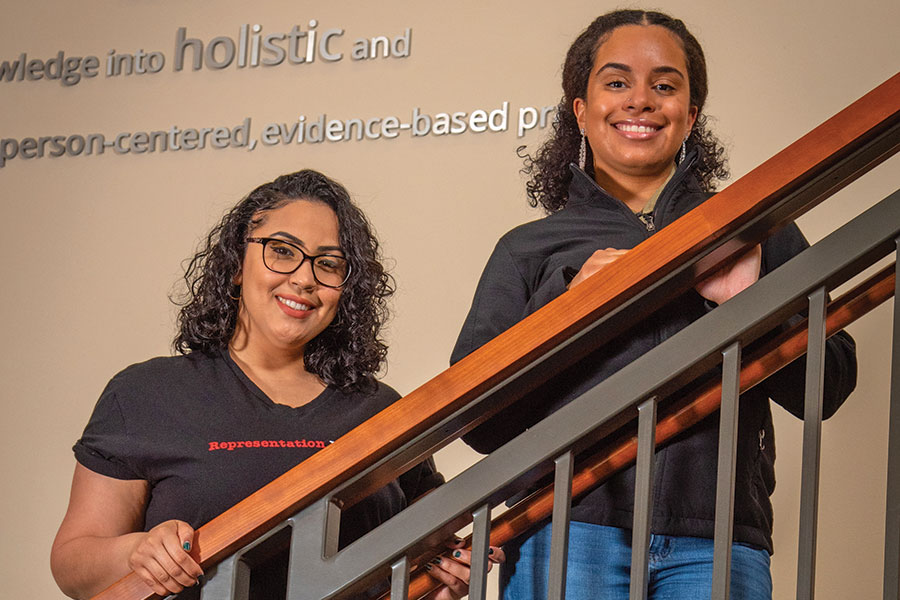LAST WORD
A Place to be Seen and Supported
What started as a safe space for Nazareth graduate students has grown into an important network of support for students of color.

Noheli Ruiz (left) and Jasmine Torres, speech-language pathologists, used their own experiences as a catalyst to develop an alumni mentorship network for current students.
Noheli Ruiz ‘19G and Jasmine Torres ‘19G met at Nazareth in the speech-language pathology (SLP) master’s program and connected immediately over their shared experiences of pursuing an education in a field where people of color (POC) account for just 8% of the workforce. During their last year in the program, Ruiz and Torres, with the help of two professors — Carly Maldonado Alicea '12 and Rupert Johnson, both of the Communication Sciences & Disorders (CSD) Department — worked together to form a safe space for Nazareth students in the CSD programs who identify as POC. In their brainchild’s second year, Ruiz and Torres remain highly involved with the Speech-language Therapy and Audiology Minority Program (STAMP).
Why did you start STAMP?
Ruiz: My time as a student at Naz was really tough for me. Occasionally, I was told that if I wanted to be successful in this field, I would have to change the way I spoke and “learn better English and grammar.” If it wasn’t for Jasmine and another friend, I would have dropped out and not made it to where I am today. And that was something that I wanted to give to others — the same support that I received. I want other students who may be experiencing similar feelings to have a place where they can share their experiences, thoughts, and concerns and to also have that support from others to keep pushing on toward accomplishing their goals.
Torres: Often, students who identify as POC have a difficult time feeling a sense of belonging in a predominantly white program where they don’t see or relate to other peers and professors with different cultural experiences and backgrounds. This can take a huge toll on one’s well-being and success in school, especially in a pre-professional program that is already demanding. I dealt with a lot of my own struggles regarding identity and self-doubt, and almost gave up on the process of becoming an SLP. When I met Noheli, I realized that these hardships resonate amongst other POC students. Luckily, by having each other’s support, we made it through graduate school together!
What hopes do you have for STAMP?
Ruiz: We wanted to create STAMP as a safe place for students where they can receive the support they need to navigate our field. One of the things that I wish I had throughout my college career was a mentor to guide me. Jasmine and I launched a mentorship program to give minority students the opportunity to connect with Naz alumni mentors who were also one of few POC in their cohorts. Right now, we have a group of 10 mentors and 18 mentees — both undergraduate and graduate students. We are super excited to provide the support that we feel minorities in SLP and audiology programs need to become successful.
Torres: My goal for STAMP was to reach out to other POC students in the CSD program to let them know that their experiences are valid and that they are not alone in their journey. I also want students to establish meaningful connections while feeling supported and confident in themselves as individuals and future professionals — and to know that they do belong in the field. Although the pandemic has affected our events this year, I feel that STAMP is having a meaningful impact on POC students' interest in staying in school.
Describe the impact of the STAMP program.
Ruiz: Because of the rough experiences I had as a Naz student, I am passionate about ensuring that the cohorts after me will never have to feel as alone and unwelcomed as I once was. Other members have stated that STAMP allowed them to become more confident in themselves, to embrace their culture, and to not be afraid of who they are. It gives me great joy to know that STAMP was an essential part of their time at Naz and that we supported them in every way possible.
Torres: One of my favorite aspects of the program is how members are able to establish meaningful and professional relationships with each other that continue beyond school. There are former STAMP members who are planning to be mentors in our new mentorship program this semester. Current and former students still reach out to each other for support and guidance. Having those ongoing connections makes all the difference as we each develop into our careers.
What keeps you going?
Ruiz: I feel a sense of responsibility to ensure that the minority students in our field feel supported and welcomed. As a professional now, I have come to see how important representation is when working with clients and how much we need to diversify the field. In a way, I feel that STAMP can play a role in retaining minority students. I thoroughly enjoy being a part of STAMP and feel that being a mentor is my calling.
Torres: I feel that it is my duty to make changes in the CSD profession, where minorities are underrepresented. Regardless of our cultural/ethnic backgrounds, we all belong. By sharing my own experiences and supporting the journey of other POC students, I help them realize that they can make it into the profession and they can also make a difference.
Noheli Ruiz is a speech-language pathologist at HealthPro Heritage. Ruiz also works with Strong Memorial Hospital and Clinical Associates of the Finger Lakes from time to time. Jasmine Torres is a speech-language pathologist at Clinical Associates of the Finger Lakes.